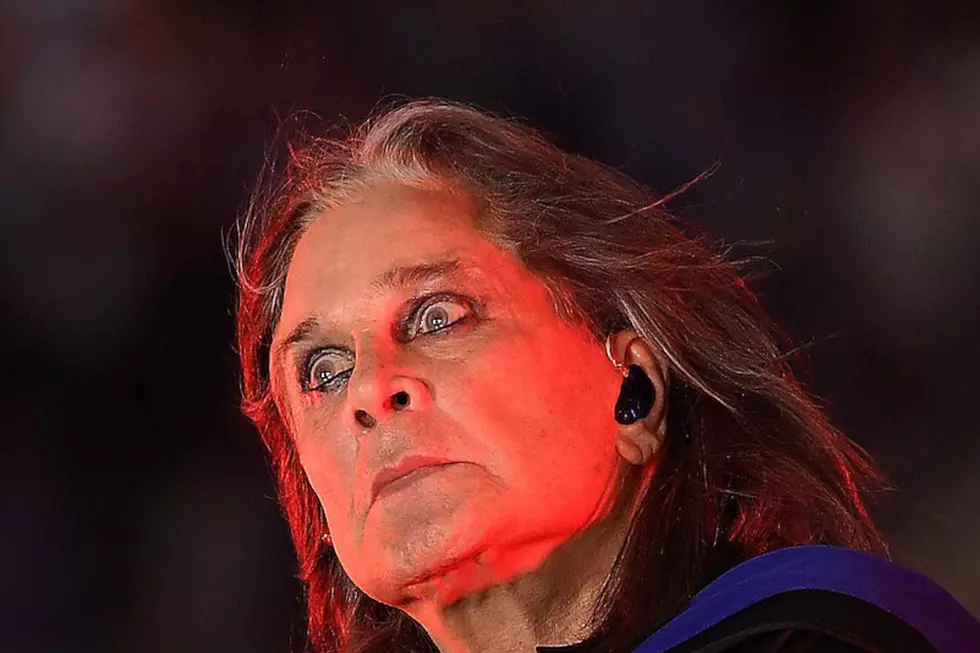
Randy Rhoads Biographer Sheds Light on the Man Behind the Myth
This year marked the 30th anniversary of the passing of guitar maestro Randy Rhoads.
The Southern Californian might have died in a tragic plane accident at the age of 25, but his mark on the music world is irrefutable.
After recording two studio albums with Quiet Riot, Rhoads changed the course of hard rock history when he joined forces with Ozzy Osbourne. The young guitarist's solos melded the dramatic flair of classical music with the urgency of heavy metal, birthing a legion of copycats along the way.
Many writers have covered Rhoads and his influence throughout the years since his death, but no one has captured his essence as closely as Steven Rosen and Andrew Klein have. The pair's new Randy Rhoads book is a 400-page behemoth, packed with rare photos, poignant stories and most importantly, interviews with the people closest to the young guitarist during his life.
First off, can you give us a quick background on how you first heard Randy?
It was 1980. I was in the 6th grade at the time. All the kids in school were talking about the former Black Sabbath singer who had recently bit the head off of a bird. Although a despicable thing to do, it was pretty smart of the Osbournes to conjure that up. It got people talking about them, which led to record sales. My favorite bands at the time were Rush, Styx, and Van Halen.
As the first song, 'I Don't Know' began to play, I was surprised at how much I liked it. The first thing that struck me was the lyrics. I thought they were brilliant. Then, the guitar solo began to play. I will never forget how I felt at that moment. Having been a fan of Eddie Van Halen's and that style of playing, I was blown away by what I was hearing. It was so different from Eddie. It wasn't as rough. It was more thought out and polished. Eddie was guided by feel and spontaneity. Randy worked feverishly for hours on every note. Somehow, at 10, I was aware of this. I could hear in his playing how much work he put into it. From there, Ozzy and Randy's visibility snowballed. A picture disc was released that included a live bonus track that wasn't on the record. It was called 'You Said It All.' It also included live versions of 'Suicide Solution' and 'Mr. Crowley.' Again, it was utterly amazing. It was the first time I heard Randy play live. Soon thereafter, I won the Exit Stage Left album by Rush in a radio contest. My older brother, Todd, took me to the radio station to collect the record and I was informed that it had vanished. Perhaps given to someone else by mistake. So, they told me I could pick any other record I wanted from a stack of new records that were in a box. I started to go through the albums, and voila, the Diary of a Madman album was staring right back at me. I had no idea Ozzy had released another album. In fact, when I got the Diary album that day, I don't think it had hit the stores yet. When I got home and played 'Over the Mountain,' what I felt was confirmed; Randy Rhoads was the greatest guitar player ever! I had now become the obsessed fan that had to have everything.
Watch 'Crazy Train' Live
He was a gentle soul and he was not a blowhard. I'm not sure which way to argue the "nature vs. nurture" theory with respect to Randy. Some people think that when we are born, we are a blank canvas shaped by our parents, upbringing, and environment. I believe that is true to a large degree. But there is also an element that we bring with us into this world. It is what makes us unique individuals. There are components of each one of our personalities us that has nothing to do with how we were raised or what we were taught. Randy was brought up in a strict home for the most part. Mrs. Rhoads demanded respect and Randy's friends were scared to death of her. But at the same time, Randy's house was the party house. That's where everyone gathered for 4th of July parties, Christmas parties, etc. The band always rehearsed in his garage and Mrs. Rhoads helped them buy equipment and she even piled their gear into her car when they began playing Stough Park. I'm sure his mom had a lot to with who he was, especially musically. She was lenient within the confines of her rules. Randy was the golden child who could do no wrong in her eyes.
(Randy and his fiancee, Jodi Vigier)
A lot has been written about Randy and his legacy throughout the years, but nothing as definitive as your book. How long did it take to put this thing together? Did you ever feel like you bit off a little more than you could chew?
Absolutely. I still feel that way! The formation of the book lasted 4 and a half years, start to finish. It is definitive because we interviewed everyone who ever knew Randy. None of these people had ever spoken publicly about Randy. They helped us and our readers get to know him better and in a very personal way. We had all read the same stories over and over again as told by those who speak about Randy from time to time. Now, in our book, we get to learn about who he was, what shaped him, and how he felt about many things.
The process of writing, editing, and rewriting was arduous to say the least. I can't begin to count the number of times I was in Kinkos at 2:00 A.M. printing new drafts and then leaving them on the doorstep of our editor's home. Our editor, Peter M. Margolis set a very high standard for me. He was constantly challenging me to do it better. If I couldn't, then it wasn't good enough for his approval. There were times I felt he would never be satisfied. When it was all done, we thought it was very good, but not great. It was then that we were introduced to Steven Rosen. Steven is a veteran of rock and roll journalism. He is the most brilliant writer of our generation. He sat down with me and brought my book up to his level. He put his stamp on it and presented it with his own style. I will forever be thankful to him. We have been getting so much praise for how well the book was written. That is attributed to Steven 100%. It would be a very different book if not for him. So, for all those moments that I felt like I bit off more than I could chew, I would dare to say in retrospect that the end justified the means. I wouldn't change a thing.
After speaking with so many people that were close to Randy, what surprised you most about him?
I never knew how much he cared for his friends. He was super sensitive. He loved the holidays and he loved to buy presents for people. He was also an amazing artist. The pictures he drew are incredible. He would send his fiance, Jodi, letters and draw quick sketches of people they knew or of his friends. Amazing. He was an incredible artist in every way and super sensitive to the feelings of others. He was also very funny and mischievous in an innocent way. He loved to have fun and make others laugh. If he was in the privacy of his friends' company, he could be himself, which was when he was happiest.
In the hard rock world, he's become a mythic figure. If you had to pick one guitar solo that best represented Randy, what would it be and why?
Well, if I may, the one that 'he' would pick is 'Mr. Crowley' or possibly 'Diary of a Madman.' 'Flying High Again' is another one that he was proud of. For me, 'Crazy Train' has a solo that
Listen to Quiet Riot's 'Breaking Up Is a Heartache,' it is a good representation of this. The solo section is identical to 'Looking At You, Looking At Me.' Randy did that a lot. He took some of his favorite Quiet Riot moments and converted them to Ozzy songs. 'Crazy Train' is probably the most iconic song Randy recorded. It has become a national sports anthem and can be heard blaring for hundreds of thousands of fans every week in every stadium. It's hard to believe it was recorded more than 32 years ago. It still sounds fresh and new.
Listen to 'Breaking Up is a Heartache
Like The Beatles and Jimi Hendrix, Randy's music will forever stand the test of time. He is still around us and he always will be, as long as we continue to listen to his music.

Randy Rhoads, the book, is out now via Velocity Publishing Group at this link.
More From Noisecreep









